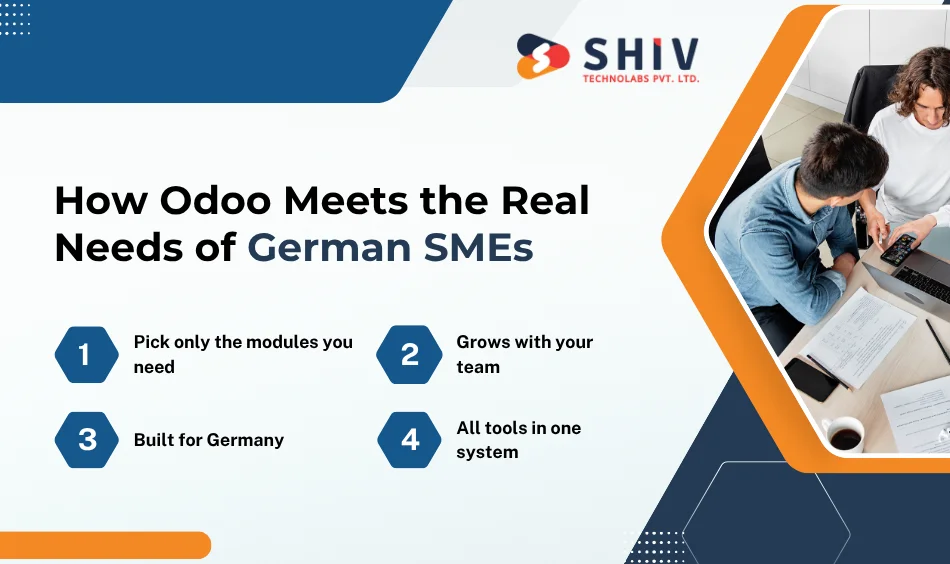Table of Contents
Many small businesses in Germany are now using ERP tools. A report by Bitkom shows that over 65% of German SMEs already run some kind of ERP or business system.
But the way they choose software is changing. They no longer want complex tools that cost too much. They want something modular, affordable, and built for real work. That’s where Odoo fits in.
Odoo partner Germany teams help these businesses get a setup that works for their size and budget.
Here’s what to look for when picking a smart ERP and how Odoo fits in.
What Small Businesses in Germany Expect from ERP in 2025
Small businesses in Germany need ERP systems that are simple, fast, and built for their size. Here’s what matters most in 2025:
Clear pricing with no hidden costs
SMEs want to know what they are paying for. They don’t like long contracts or surprise charges.
Fast setup with no downtime
Time is money. The ERP should work quickly without stopping the business.
GDPR-ready from day one
The software must keep data safe. Local servers and consent features are must-haves in Germany.
Mobile access for daily use
Teams want to check reports, orders, or stock from their phones anytime, anywhere.
Easy-to-use design
Staff don’t want long training sessions. The system should feel simple and work in German.
These points help define a good ERP for small businesses in Germany. A tool that meets these needs can support real growth.
How Odoo Meets the Real Needs of German SMEs

Odoo offers a smart way to run your business. It gives German SMEs a system that matches their real needs, without adding extra cost or features they don’t want.
Pick only the modules you need
Odoo has apps for sales, accounting, HR, inventory, and more. You can start with just a few and add more later. This way, you pay only for what you use.
Grows with your team
You can start small and grow fast. Odoo works well for 5 users or 500. Whether you’re a local shop or a fast-growing startup, the system fits your pace.
Built for Germany
Odoo supports the German language and follows local tax and invoicing rules. It’s ready for German accounting and other EU standards.
All tools in one system
No need to jump between platforms. Odoo connects your sales, support, finance, warehouse, and HR in one place. You get a clear view of your business.
These are some key benefits of Odoo ERP in Germany. Businesses don’t need a complex setup—they need one that just works.
Comparing Odoo vs SAP for German Companies
Odoo and SAP are two common ERP options. But for many German SMEs, the choice is easier once you compare key factors:
| Factor | Odoo | SAP |
|---|---|---|
| Cost of licensing | Low and modular | High and fixed |
| Setup time | Few weeks | Several months |
| Flexibility | Fully customizable | Often rigid |
| Source code | Open-source | Closed |
| Support cost | Affordable local support available | Usually high |
Large enterprises often choose SAP, but smaller firms prefer Odoo for better control and lower costs. That’s why many German companies pick Odoo over SAP—especially when speed and pricing play a key role.
Read more: Odoo vs SAP: Which ERP Software Is Right for Your Business?
Real Use Cases: Which Industries in Germany Use Odoo Best
Odoo works across many sectors. German companies are using it to cut manual work and bring everything under one roof. Here’s how different industries use Odoo every day:
🏭 Manufacturing
Firms use Odoo for production planning, raw material tracking, and MRP. It helps manage work orders, monitor stock, and reduce waste.
🛍️ Retail
Shops use Odoo POS for quick checkout, inventory sync, and customer loyalty tracking. It also links with online stores.
💼 Service Providers
Agencies and consultants use Odoo to manage projects, timesheets, and invoices in one place. It makes client work easy to track.
🛒 E-commerce
Odoo supports online sales through multiple channels like Shopify or Amazon. Features like automated stock updates and delivery tracking help save time.
Each of these industries shows how easy Odoo implementation in Germany can be when done with the right setup.
How to Choose the Right Odoo Development Partner in Germany

The right ERP tool needs the right team behind it. Picking the right Odoo development partner can make or break your setup.
Here’s what to look for:
- Local support: Choose someone who speaks your language and knows German business rules.
- Experience in your field: Ask if they’ve worked with companies like yours.
- Long-term help: Pick a team that supports updates, fixes, and feature changes later.
- Proof of work: Ask to see client examples and case studies.
Looking for expert help with your ERP system? It’s best to work with a team that offers local support and understands how German businesses operate.
You can start by checking out Odoo development services that are tailored to fit the needs of SMEs in Germany.
How German SMEs Are Using Odoo in Real Life
Odoo is already helping many small and mid-sized firms in Germany solve daily challenges. Here’s how some companies are using it in real settings:
These examples show how Odoo fits the pace and scale of real German businesses.
A retail store in Berlin adopted Odoo POS to manage sales and inventory together. Their checkout process got faster, and restocking became easier with real-time updates.
A service company in Hamburg replaced three separate tools for billing, timesheets, and CRM. Now, their project managers use Odoo to track work, send invoices, and manage client accounts—all in one system.
A manufacturer based in Stuttgart needed better control over production. They started using Odoo’s MRP features to handle raw materials, schedules, and machine usage. Within months, they reduced planning delays and stock waste.
A fashion startup in Munich built its online store with Odoo eCommerce. Since then, they’ve expanded to offline sales too—connecting their website with a POS system without switching tools.
Even smaller teams find value. A 5-person agency in Cologne now uses Odoo for basic accounting, payroll, and expense tracking. What do they like most? No monthly fees for unused features.
Conclusion
Your business needs more than software—it needs tools that grow with you. German SMEs are shifting to ERP systems that are simple, fast, and fair in cost.
Odoo checks all the right boxes. Its modular design, German-ready features, and lower price make it a smart fit for growing businesses.
Want to see if it’s the right fit? Start with an expert team like Shiv Technolabs and move ahead with confidence.























